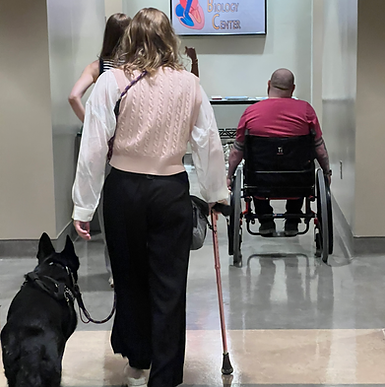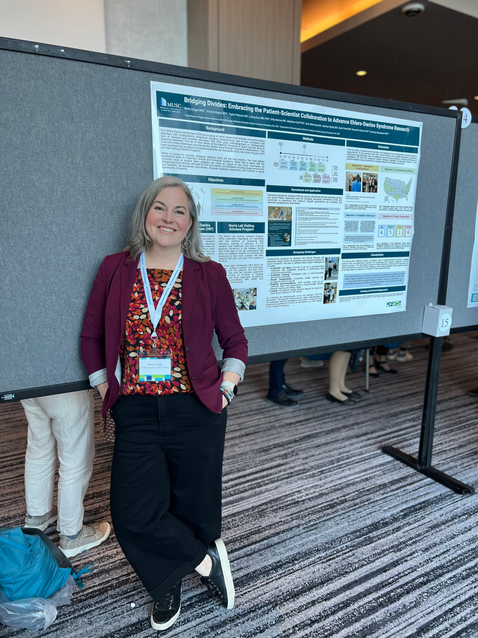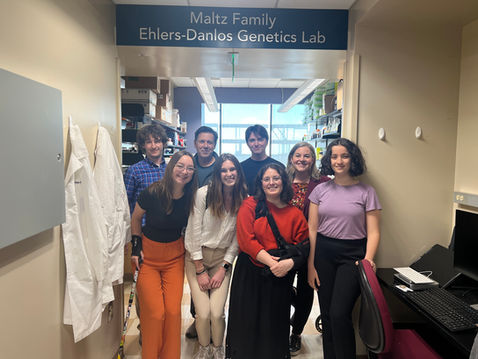EDS Patient-Scientist Initiative
Empowering Patients to Be Part of the Solution
In a world where illness can often be interpreted as weakness, the Gensemer Summer Intern Program addresses a perspective that contradicts that assumption. Rather than disease being seen as a disadvantage, it instead is viewed as a superpower--a philosophy that serves to introduce the patient-scientist model in medicine at MUSC.
-- Amy Weintraub for the MUSC Catalyst
The Patient-Scientist Model
When it comes to complex diseases, patients often are the true experts. The lived patient experience leads to important clinical and biological questions. When that is paired with the scientific tools to answer them, patients can make an impact on the entire community.

Our goal is to build a community of physicians, scientists and health care professionals who understand this disease – and who better than patients themselves? By doing so, we can change the perception of EDS and HSD, foster new research discoveries and advance clinical care. Our educational initiatives aim to make an impact for generations of patients in the future, while also providing an inclusive environment for students with disabilities to have an equal opportunity to thrive.
These opportunities not only grow the number of people in research and healthcare dedicated to EDS, but also offer a valuable opportunity to academically talented and motivated students who confirm a strong interest in graduate and/or medical studies.
Living the Science


When you look at the patient and scientist journeys side by side, it becomes clear that both are facing serious roadblocks—but from opposite ends.
For patients, the journey often starts with confusing symptoms that are dismissed or misunderstood. They face long delays in receiving a diagnosis, encounter a lack of research-driven answers, and are left with few effective treatments. On the other hand, scientists struggle with outdated assumptions, limited disease models, and significant challenges securing funding. Often, their efforts are misdirected due to a lack of relevant and clear priorities.
But what if we bridged these two paths? The patient-scientist journey brings together lived experience and scientific training to drive clinically relevant research, generate new tools, and create meaningful progress for the entire EDS community.

Program Development
The Norris Lab seeks to address the historical challenges faced by chronically ill and disabled patients by engaging them fully as collaborative partners, integrating their valuable perspective into the research process. Through the generosity of our philanthropic supporters, we developed two pioneering programs for patient-scientists:
an 8-week summer internship and a short-term immersive research experience offered year-round.

Gensemer Hypermobile Ehlers-Danlos Syndrome Intern Program
In 2020, Dr. Chip Norris was approached by a private donor eager to support his lab's research on EDS. This initial gift sparked the idea for a summer internship program dedicated to patients interested in pursuing graduate or medical school. Inspired by the dual role of his PhD student, Cortney Gensemer, as both a patient and scientist, Dr. Norris launched the first patient-scientist internship program. In the summer of 2021, four interns joined the lab for a 10-week experience, collaborating with graduate students and post-docs on EDS research projects.
The interest in this program grew rapidly, and starting in 2022, the Fullerton Foundation generously funded the program for a three-year period. This funding allowed us to expand the program to 5 interns/year and build on the success of our first year.
In the first four years of this program, we’ve received 152 applications from around the country, out of which 19 interns have been selected. Many of these interns have since gone on to gain admission to prestigious MD, PhD, and MD/PhD programs, and employment in research labs around the country.
Visiting Scholars Program
One thing that was quickly evident is that our capacity of our intern program could not keep up with the demand. Thanks to generous funding from the Speer Foundation, we've been able to expand our patient-scientist offerings to include short-term shadowing experiences throughout the school year. Over three days at MUSC, participants engage with our research, shadow scientists and physicians, connect with EDS patients, and learn from experts. This brief but immersive experience enables scholars to participate in ongoing research and form meaningful connections, all while accommodating their health and academic needs.
In the first year of the Visiting Scholars program, we received 116 applications from talented, diverse, and motivated individuals eager to contribute to EDS solutions—many of whom had previously applied to our summer intern program
During the 2023-2024 school year, 15 visiting scholars joined us, still leaving a large number of applicants turned away. We continue to work to increase the capacity of our programs, and by restructuring VSP, we were able to invite 35 visiting scholars to participate in the 2024-2025 school year.
Addressing Challenges
Implementing programs for participants with chronic illnesses and dynamic disabilities requires careful consideration and proactive solutions to ensure inclusivity.
Lab Accommodations
The Norris lab is set up to accommodate individuals with disabilities, ensuring a comfortable and productive environment. Changes to the lab include:
-
Automatic lab doors
-
Lowered lab benches
-
Ergonomic pipettes
-
Adjustable computer monitors
-
Repeater pipettes
-
Low derma gloves
-
Chairs available at every bench
As importantly though, at the Norris lab we normalize using assistive devices, from braces to mobility aids, and ice packs to electrolytes. By openly embracing and using needed aids, we create an environment where participants feel safe speaking their needs and are confident that they will be met with empathy and practical support.


Beyond the Programs
Our dedication to the patient-scientist model extends to the makeup of our lab itself. Almost half of our lab have EDS or HSD themselves, and our patient-scientist programs are predominantly run by our full-time patient-scientist lab members. This peer-led model ensures a deep understanding of the challenges faced by participants and creates a supportive and empowering experience in which participants can fully engage in their research endeavors.
The resounding success of these initiatives underscores the imperative for other institutions to emulate similar programs, empowering individuals with chronic diseases to actively shape the trajectory of research in their respective fields.
In Their Own Words

Sydney Severance
HIP 2024
Connecting to something bigger than myself to help future generations with EDS, gives me hope and purpose. And that is what the Norris Lab enables through this unforgettable internship. Beautiful things can come out of tough situations and this opportunity has been absolutely beautiful. The impact of this internship doesn’t stop when it's over. Right now, you see a bunch of excited and energized students inspired that we had great mentors and exciting data. What you may not see is the confidence that each of us has internalized, and the cascading effect that this program has enabled.

Arianna Meurlott
VSP 2023-2024
As someone who has hypermobile Ehlers-Danlos Syndrome, I struggled with the lack of representation of chronically ill and disabled individuals in research. I often discouraged myself from pursuing certain career paths and opportunities due to this, but the Norris Lab showed me that there are people just like me who have the kind of careers that I dream of.

Sofie Strompf
HIP 2024
I was unsure as a disabled individual if I have a place in science. As a student my disability has impacted my studies as I've had to take time off for surgeries. I've had advisors and professors urge me to change my major to a non-stem track. Participating in this not only reaffirmed my place in science, but it showed me how important it is that I continue my path in biomedical research and medicine.


























